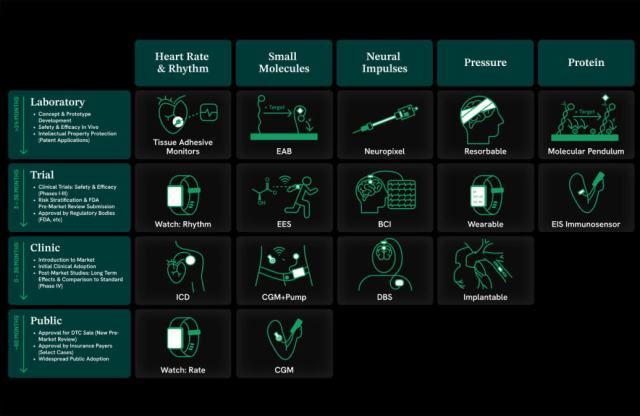Sep 18, 2018 · 5 min read
Helmsley Charitable Trust and Chan Zuckerberg Initiative announce new grant opportunities to support the growth of the Human Cell Atlas
The Leona M. and Harry B. Helmsley Charitable Trust (Helmsley) and the Chan Zuckerberg Initiative (CZI) are partnering on a new, collaborative Request for Applications (RFA) to support the continued development of the Human Cell Atlas (HCA), an international effort to map all cells in the human body. The full RFAs and application instructions are now live on a common portal, which is open until November 13, 2018.
Helmsley seeks applications that will collaboratively create a Gut Cell Atlas (GCA), cataloguing the many cell types in the small and large intestines. This initiative aims to understand distinct cell functions and interactions in health and Crohn’s disease. The Crohn’s Disease Program at Helmsley is committed to improving the lives of patients while pursuing a cure. Through the GCA, Helmsley aims to advance precision medicine by understanding the link between cell states, tissue function, and emergence of disease. The GCA will serve as a foundation for the development of new, effective treatments for Crohn’s disease, and will also serve as a model for building other comprehensive organ system atlases.
“The Human Cell Atlas is transforming what we know about how cells change and cause disease, and there is an urgent need to map the cells of the gut at high resolution,” said Garabet Yeretssian, PhD, Director of the Helmsley Charitable Trust’s Crohn’s Disease Program. “By creating a Gut Cell Atlas, there is tremendous potential to better understand Crohn’s disease and gut health issues and develop better treatments for patients.”
The GCA will support Helmsley’s Crohn’s Disease Program’s goals of determining which specific cell types express genetic risk variants for Crohn’s disease and how these variants impact the function of different cells. The GCA will also help researchers elucidate the effect of specific therapeutics and mechanisms of resistance to common therapies.
Helmsley invites applications for up to three-year projects from principal investigators to examine the small and large intestines in healthy individuals and in Crohn’s disease patients, from both unaffected and diseased regions. Experts across different disciplines are encouraged to apply their knowledge of cell systems and technologies to the gut.
CZI seeks applications for three-year projects to form Seed Networks that characterize any tissue in the healthy human body. Seed Networks will support continued growth, solidify collaborations, and help generate valuable data and tools for the first draft of the HCA. Seed Networks should consist of at least three principal investigators, including at least one computational biologist or software engineer, together with additional computational biologists, engineers, experimental biologists, and/or physicians.
“CZI Science is thrilled to partner with the Helmsley Charitable Trust to further support the global Human Cell Atlas project. This program is a sign of the collective excitement for the HCA worldwide,” said CZI Head of Science Cori Bargmann. “Collaboration is the heart of this worldwide effort, and CZI’s Seed Networks — consisting of scientists with diverse skills — will help rapidly accelerate progress towards a first draft of the HCA.”
The Human Cell Atlas is a scientist-led initiative that has emerged as a collaborative federation of diverse experts in biology, computation, and medicine. Seed Networks will bring in new participants and provide additional support to ongoing collaborative networks. Investigators in the Seed Networks will have the opportunity to learn and collaborate with the community, as well as with CZI computational biologists and software engineers.
The three-year Seed Network projects should generate new tools, open source analysis methods, and significant contributions of diverse data types to the Human Cell Atlas Data Coordination Platform, a unified resource that will enable data sharing across researchers and research institutes. CZI is working together with the European Bioinformatics Institute, the Broad Institute of Harvard and MIT, and the University of California, Santa Cruz to formulate, fund, and jointly build this Data Coordination Platform.
CZI’s early support of pilot projects for the HCA has helped the community develop shared goals, standards, assays, protocols, and computational resources while exploring a landscape of potential HCA projects. The Seed Networks RFA is CZI’s third RFA in support of the HCA over the past two years. Previously, CZI announced support for 85 new projects to create collaborative computational tools in support of building the HCA, as well as 38 pilot projects to help establish best practices and technologies.
About the Helmsley Charitable Trust
The Leona M. and Harry B. Helmsley Charitable Trust aspires to improve lives by supporting exceptional efforts in the U.S. and around the world in health and select place-based initiatives. Since beginning its active grantmaking in 2008, Helmsley has committed more than $2 billion for a wide range of charitable purposes. Helmsley Charitable Trust’s Crohn’s Disease Program supports impactful ideas and mobilizes a global community committed to improving the lives of Crohn’s disease patients while pursuing a cure. For more information, please visit helmsleytrust.org.
About the Chan Zuckerberg Initiative:
The Chan Zuckerberg Initiative was launched in December 2015 by Mark Zuckerberg, founder and CEO of Facebook, and Priscilla Chan, a pediatrician and founder and CEO of The Primary School in East Palo Alto. The Chan Zuckerberg Initiative is a new kind of philanthropy that seeks to engineer change at scale. By pairing world-class engineering with grant-making, impact investing, policy, and advocacy work, CZI hopes to build a future for everyone. Initial areas of focus include supporting science through basic biomedical research and education through personalized learning. CZI is also exploring ways to address barriers to justice and opportunity — from criminal justice reform, to expanded access, to economic opportunity and affordable housing.





